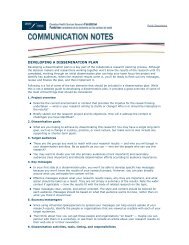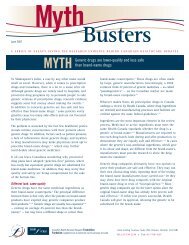Full Report
Full Report
Full Report
Create successful ePaper yourself
Turn your PDF publications into a flip-book with our unique Google optimized e-Paper software.
Executive Summary<br />
The Chronic Disease Management (CDM) project was launched in September 2010 as<br />
a partnership between the NWT Department of Health and Social Services (DHSS) and<br />
the Canadian Foundation for Healthcare Improvement (CFHI), a national not-for-profit<br />
organization. An integral part of the Department’s ongoing efforts to reduce the risk and<br />
improve the management of chronic disease, the CDM project pursued three objectives:<br />
• Develop pilot improvement projects (IPs) that maximize the use of resources<br />
and provide care based on evidence and informed practices.<br />
• Apply lessons from these projects in the development of an integrated CDM strategy.<br />
• Strengthen capacity and self-reliance in the use of evidence to inform sustainable<br />
and efficient health system decisions, processes and policy.<br />
Targeted pilot projects<br />
The IPs addressed three chronic disease areas:<br />
diabetes, renal disease and mental health. The<br />
diabetes IP team focused on building the capacity<br />
of primary care teams to provide self-management<br />
support (SMS) to people with type 2 diabetes in<br />
Behchoko, Norman Wells and Yellowknife. To support<br />
this goal, the IP team created a self-management<br />
training package, delivered SMS training to primary<br />
care service teams, and implemented SMS activities<br />
as part of routine care in each pilot site.<br />
The renal disease IP team focused on integrating the<br />
provision, and increasing the consistency of renal<br />
care across the Territory. Yellowknife Health and Social<br />
Services Authority (YHSSA) and Hay River Health and<br />
Social Services Authority (HRHSSA) supported the<br />
project through the piloting of a centralized renal<br />
patient database while Stanton Territorial Health<br />
Authority (STHA) supported the project through the<br />
use of their central referral intake. The IP team set out<br />
to standardize the definition and process for primary<br />
care decision support of early stage renal disease<br />
detection and management.<br />
The mental health IP team focused on standardizing<br />
referral practices and the sharing of mental health<br />
information between the communities of Fort Good<br />
Hope and Fort Simpson and the psychiatry unit and<br />
emergency department at STHA and outpatient psychiatry<br />
at YHSSA. During the pilot, the team developed<br />
standardized referral and information sharing pathways,<br />
trained care providers on use of the new pathways, and<br />
implemented the pathways in the pilot communities.<br />
Marked improvements<br />
In less than three years, the CDM project has<br />
strengthened local capacity in evaluation, change<br />
management and performance management. It has<br />
enhanced leadership and engagement by training<br />
3<br />
Making the Case for Change














